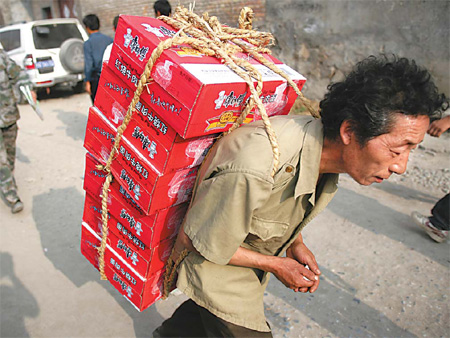China
Risk of disease growing in mudslide-stricken region
By Peng Yining and Wang Qian (China Daily)
Updated: 2010-08-11 11:39
 |
Large Medium Small |
|
 A mudslide victim in Zhouqu county walks in the street with disaster relief material he received on Tuesday. Du Lianyi / China Daily
|
Getting enough drinking water is top priority for now, officials say
ZHOUQU, Gansu - Insufficient drinking water and toilets, weak infrastructure and crowded living conditions are increasing the possibility of an outbreak of infectious diseases after a major mudslide in this Northwest county early Sunday morning.
"If we cannot guarantee safe drinking water and a healthy living environment, it is highly risky for infectious disease to occur," Yang Jian, a senior official with the Chinese Center for Disease Control and Prevention, which is now helping with the rescue and relief work in Zhouqu, told China Daily on Tuesday.
| ||||
Water is most crucial for epidemic control at the moment, and it appears that the water in Zhouqu is unsafe for health, although the final test result is on its way, he said.
In a temporary medical center in Zhouqu No 1 Middle School, several children and some adults suffered from diarrhea on Tuesday, said Yang Long, a 45-year-old doctor who is in charge of the center.
"Unhealthy drinking water and food mainly caused the disease and we need more medicine," Yang said.
Besides safe water and food supplies, healthy habits are very important to prevent sickness, Yang said.
Bai Jinyi, director of a disinfection team in Zhouqu, said the amount of garbage is increasing rapidly because of the damage and the continual resettlement of affected residents.
"It (garbage) is bad for health and victims are often going back and forth to their shattered homes to look for valuable things, which also increases the possibility of them getting sick," Bai said.
Yang Haifeng, a 42-year-old surgeon in the temporary medical center, said people must pay much attention to safe drinking and eating, and wash their hands frequently.
Due to the high temperature in Zhouqu, food easily becomes rotten and water must be boiled before drinking, he said.
The temporary medical center is located in the lobby of the school, about 100 square meters, and doctors' tables are made of several school desks pushed together. Only minor injuries and diseases like cold and fever can be treated under such conditions, doctors said.
All the 11 doctors in the center, who are from hospitals in other regions of the Gannan Tibetan autonomous prefecture, arrived in Zhouqu on Sunday afternoon right after the mudslide. Zhouqu has set up five such medical centers.
To prevent diseases, the local disease control bureau is sending people every day to disinfect all the settlements as well as public places like schools and garbage collection sites.
Deng Situo, a 42-year-old worker in a local disease control bureau, said every day more than 250 disinfection tablets are used, covering 10 classrooms and several toilets.
"It takes six people and at least two hours for every disinfection and we do the disinfection about six times a day," Deng said.
On the scene, a China Daily reporter witnessed that most medical staff and soldiers had white towels instead of masks over their faces during work, which shows masks and disinfection materials are still in great need.
The Ministry of Health has sent 21 medical teams and 363 medical staff to Zhouqu to provide medical aid, Deng Haihua, spokesman of the ministry, said at a news conference on Tuesday.
"The ministry has cooperated with the military and airlines to get ready for the transport of the injured, and an expert team has been set up to help the severely injured get necessary treatment within 48 hours," Deng said.
As of Monday afternoon, the Zhouqu county hospital has treated 117 injured people, including 29 who were severely wounded, according to the latest statistics from the ministry.
China Daily



